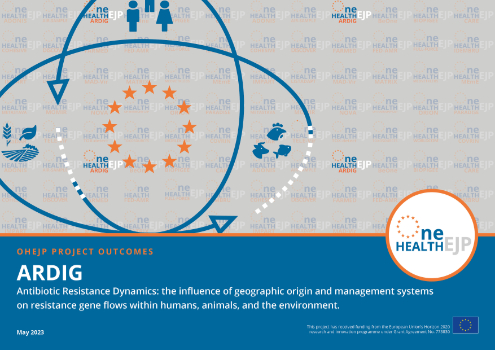25 Rue du Docteur Roux, Paris 15e Arrondissement, Île-de-France, France
Seestraße 10, Berlin, Berlin, Germany
Droevendaalsesteeg 6708, Wageningen, Gelderland, The Netherlands
Madrid, Spain
Waterloo Road, London Borough of Lambeth, England, United Kingdom
14 Rue Pierre et Marie Curie, Maisons-Alfort, Île-de-France, France
Ullevålsveien 68, Oslo, Oslo, Norway
Max-Dohrn-Straße 8, Berlin, Berlin, Germany
Daphne Jackson Road, Guildford, England, United Kingdom
Addlestone, England, United Kingdom

The Project #ARDIG
| Start: | 1 January 2018 |
| Duration: | 3.5 Years |
| Domain: | Antimicrobial Resistance |
| Keywords: | Antimicrobial resistance, plasmid ecology, superbugs, genomic diversity, regional clusters |
| Contact: | Muna Anjum (APHA) Principal Investigator |
ARDIG: Antibiotic Resistance Dynamics: the influence of geographic origin and management systems on resistance gene flows within humans, animals and the environment.
The ARDIG project examined the dynamics of AMR in the human, animal, food and environment epidemiological unit from 6 European countries (UK, Norway, France, Netherlands, Germany, Spain), which represent significant differences in their usage of antimicrobial agents and AMR prevalence, as well as different climate and management systems, and the potential for transmission of resistance.
The project explored the ecological impact of administration of antibiotics to humans and animals, and their environment, across six countries using a One Health approach. This has provided a better understanding of the types of resistances, their prevalence and variation in different populations over time, so the occurrence of multi-drug resistant (MDR) superbugs can be controlled. Moreover, the work helps to overcome the immense limitations in comparability between data from the different sectors and countries, as highlighted in the JIACRA-report.
Project results help to identify factors influencing the transmission of AMR between animals, humans, food and the environment which can be applied not only to provide a basis to improve existing national surveillances, but also to aid in the design of new or improved global AMR surveillances strategies, as well as risk and transmission models for assessing future control measures and mitigation of risk posed by AMR. The knowledge gathered can also serve, in the future, for application of genomic surveillance and development of rapid targeted molecular diagnostics for control of AMR.
The Project Impact Brochure is available on Zenodo.
Project Assets
Nunez-Garcia, J., AbuOun, M., Storey, N., Brouwer, M. S., Delgado‑Blas, J. F., Mo, S. S., Ellaby, N., Veldman, K. T., Haenni, M., Châtre, P., Madec, J. Y., Hammerl, J. A., Serna, C., Getino, M., La Ragione, R., Naas, T., Telke, A. A., Glaser, P., Sunde, M., Gonzalez-Zorn, B., Ellington, M. J. & Anjum, M. F. (2022). Harmonisation of in-silico next-generation sequencing based methods for diagnostics and surveillance. Scientific Reports. 12, 14372. DOI: https://doi.org/10.1038/s41598-022-16760-9
Getino, M., López-Díaz, M., Ellaby, N., Clark, J., Ellington, M. J., La Ragione, R. M. (2022). A Broad-Host-Range Plasmid Outbreak: Dynamics of IncL/M Plasmids Transferring Carbapenemase Genes. Antibiotics. 11(11), 1641. DOI: https://doi.org/10.3390/antibiotics11111641
Storey, N., Cawthraw, S., Turner, O., Rambaldi, M., Lemma, F., Horton, R., Randall, L., Duggett, N. A., AbuOun, M., Martelli, F., & Anjum, M. F. (2022). Use of genomics to explore AMR persistence in an outdoor pig farm with low antimicrobial usage. Microbial genomics. 8(3), 000782. DOI: https://doi.org/10.1099/mgen.0.000782
Thomson, N. M., Gilroy, R., Getino, M., Foster-Nyarko, E., van Vliet, A, H, M., La Ragione, R. M., & Pallen, M. J. (2022). Remarkable genomic diversity among Escherichia isolates recovered from healthy chickens. Peer J. 10, e12935. DOI: https://doi.org/10.7717/peerj.12935
Savin, M., Bierbaum, G., Kreyenschmidt, J., Sib, E., Schmoger, S., Käsbohrer, A., Hammerl, J-A. (2021). Clinically Relevant Escherichia coli Isolates from Process Waters and Wastewater of Poultry and Pig Slaughterhouses in Germany. Microorganisms. 9, 698. DOI: https://doi.org/10.3390/microorganisms9040698
Juraschek, K., Borowiak, M., Tausch, SH., Malorny, B., Käsbohrer, A., Otani, S., Schwarz, S., Meemken, D., Deneke, C., Hammerl, JA. (2021). Outcome of Different Sequencing and Assembly Approaches on the Detection of Plasmids and Localization of Antimicrobial Resistance Genes in Commensal Escherichia coli. Microorganisms. 9, 598. DOI: https://doi.org/10.3390/microorganisms903059
Mesa-Varona, O., Mader, R., Velasova, M., Madec, J.Y., Granier, S.A., Perrin-Guyomard, A., Norstrom, M., Kaspar, H., Grobbel, M., Jouy, E., Anjum, M.F., Tenhagen, B.A. (2021). Comparison of Phenotypical Antimicrobial Resistance between Clinical and Non-Clinical E. coli Isolates from Broilers, Turkeys and Calves in Four European Countries. Microorganisms. 9(4):678. DOI: https://doi.org/10.3390/microorganisms9040678
Brouwer, MSM., Goodman, RN., Kant, A., Mevius, D., Newire, E., Roberts, AP., Veldman, KT. (2020). Mobile colistin resistance gene mcr-1 detected on an IncI1 plasmid in Escherichia coli from meat. Journal of Global Antimicrobial Resistance. 23, 145-148. DOI: https://doi.org/10.1016/j.jgar.2020.08.018
Duggett, N., AbuOun, M., Randall, L., Horton, R., Lemma, F., Rogers, J., Crook, D., Teale, C., Anjum, MF. (2020). The importance of using whole genome sequencing and extended spectrum beta-lactamase selective media when monitoring antimicrobial resistance. Scientific Reports. 10, 19880. DOI: https://doi.org/10.1038/s41598-020-76877-7
Massot, M., Haenni, M., Nguyen, TT., Madec, JY., Mentré, F., Denamur, E. (2020). Temporal dynamics of the fecal microbiota in veal calves in a 6-month field trial. Animal Microbiome. 2(32). DOI: https://doi.org/10.1186/s42523-020-00052-6
Rodriguez-Rubio, L., Serna, C., Ares-Arroyo, M., Matamoros, BR., Delgado-Blas, JF., Montero, N., Bernabe-Balas, C., Wedel, EF., Mendez, IS., Muniesa, M., Gonzalez-Zorn, B. (2020). Extensive antimicrobial resistance mobilization via multicopy plasmid encapsidation mediated by temperate phages. Journal of Antimicrobial Chemotherapy, 75 (11), pp. 3173–3180. DOI: https://doi.org/10.1093/jac/dkaa311
Patiño-Navarrete, R., Rosinski-Chupin, I., Cabanel, N., Gauthier, L., Takissian, J., Madec, JY., Hamze, M., Bonnin, RA., Naas, T., Glaser, P. (2020). Stepwise evolution and convergent recombination underlie the global dissemination of carbapenemase-producing Escherichia coli. Genome Medicine, 12(10). DOI: https://doi.org/10.1186/s13073-019-0699-6
Mesa-Varona, O., Kaspar, H., Grobbel, M., Tenhagen, B.A. (2020). Phenotypical antimicrobial resistance data of clinical and non-clinical Escherichia coli from poultry in Germany between 2014 and 2017. PLoS One. 15(12):e0243772. DOI: https://doi.org/10.1371/journal.pone.0243772
Gay, E., Bour, M., Cazeau, G., Jarrige, N., Martineau, C., Madec, JY., Haenni, M. (2019). Antimicrobial Usages and Antimicrobial Resistance in Commensal Escherichia coli From Veal Calves in France: Evolution During the Fattening Process. Frontiers in Microbiology, 10, pp. 792. DOI: https://doi.org/10.3389/fmicb.2019.00792
Mesa Varona, O., Chaintarli, K., Muller-Pebody, B., Anjum, MF., Eckmanns, T., Norström, M., Boone, I. (2019). Monitoring Antimicrobial Resistance and Drug Usage in the Human and Livestock Sector and Foodborne Antimicrobial Resistance in Six European Countries. Dovepress, 13, pp 957—993. DOI: https://doi.org/10.2147/IDR.S237038
Brouwer, MSM., Jurburg, SD., Harders, F., Kant, A., Mevius, DJ., Roberts, AP., Bossers, A. (2019). The shufflon of IncI1 plasmids is rearranged constantly during different growth conditions. Plasmid, 120, pp. 51-55. DOI: https://doi.org/10.1016/j.plasmid.2019.03.003




